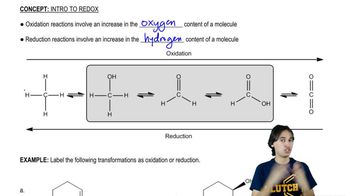Here are the essential concepts you must grasp in order to answer the question correctly.
Bond Dissociation Energy (BDE)
Bond Dissociation Energy (BDE) is the energy required to break a specific bond in a molecule, resulting in the formation of free radicals or atoms. It is a crucial concept in thermochemistry, as it helps predict the stability of molecules and the energy changes during chemical reactions. In the context of iodination of methane, BDE values are used to calculate the enthalpy changes associated with bond breaking and forming.
Recommended video:
How to calculate enthalpy using bond dissociation energies.
Enthalpy Change (ΔH°)
Enthalpy change (ΔH°) refers to the heat content change of a system at constant pressure during a chemical reaction. It can be calculated by summing the BDEs of bonds broken and formed in the reaction. Understanding ΔH° is essential for evaluating the thermodynamic favorability of a reaction, such as the iodination of methane, where the overall enthalpy change indicates whether the reaction is exothermic or endothermic.
Recommended video:
Iodination of Methane
Iodination of methane is a radical substitution reaction where iodine replaces one of the hydrogen atoms in methane (CH₄). This process typically involves the formation of methyl radicals and iodine radicals, leading to the generation of iodomethane (CH₃I). Analyzing the enthalpy changes during this reaction requires an understanding of the steps involved, including initiation, propagation, and termination, which are influenced by the BDEs of the involved bonds.
Recommended video:
General Features of Redox
 Verified step by step guidance
Verified step by step guidance Verified video answer for a similar problem:
Verified video answer for a similar problem:



 4:09m
4:09m